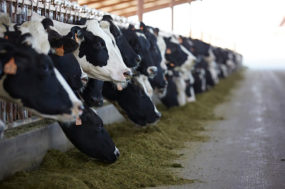Having procedures and policies in place that are carried out and enforced is, of course, very important – but often on the dairy, the enforcement is difficult.
Furthermore, there are so many different tasks that might only be done once a year, or every few months, coming up with a procedure everyone will remember and follow is difficult. You may not even have a procedure for these one-off tasks.
Ask yourself this: Do I have a procedure for safe chemical handling? If your answer is no, or if you do but it isn’t enforced, then ask yourself this: Do I have the right physical safety measures in place that if someone was handling chemicals in an unsafe manner and an accident happened, could we take the steps to mitigate the damage?
This physical measure may be a shower or an area to rinse off the team member nearby if they spilled a chemical on themselves, or an eye-wash station if the chemical splashed into their eyes.
Having policies and procedures is obviously a great way to ensure health and safety on the farm, and is a requirement under the Occupational Health and Safety Act, but also having some physical safety measures in place will help to ensure in case of emergency, or if an accident occurs, you can do everything in your power to mitigate the damage to a team member.
Here are some physical items we can have on hand at the farm to ensure further safety:
Eye-wash station
An eye-wash station should be located on your farm, preferably in a central location, if possible. Eye-wash stations should be able to provide at least 15 minutes of continuous flow of clean, room-temperature water.
There are attachments available for purchase that can be added to an existing faucet that, when need be, turn your sink into an eye-wash station.
Add a bright yellow “Eye Wash Station” sign above so everyone can find it easily when in need.
First-aid kits
First-aid kits should include all of the necessary materials under Regulation 1101 in the act, which will give a number of items in a kit for your workplace, dependent on the number of employees you have working at any given time.
There should be a central kit location in a main location, usually a lunch room. If you have more than one location, each location should have a kit. Each vehicle or piece of equipment an employee would leave the farm in should also have a kit.
To determine what vehicle/equipment needs a kit, ask yourself this: If an injury occurred, would it make sense to get the kit from the lunch room, or would that be too far?
Fire extinguishers
This is an important one and often overlooked. For the best safety measures and efficiency, leave this to the experts.
Many producers rely on a local fire extinguisher company to send out a representative to determine the size of extinguishers and where around the facility they should be located.
You will also want to make sure there are some in equipment and vehicles, which they can also help you with.
These extinguishers should be inspected monthly by someone in the workplace and a few times a year by the company’s representative to ensure they are ready if needed.
Gas monitors, self-contained breathing apparatus (SCBA)
The SCBA is the safest, most reliable way for entry into confined spaces where there may be a buildup of gases and other atmospheric hazards.
In order to determine when a SCBA is necessary, you should use a handheld monitor to test the levels of gases present, such as carbon monoxide, ammonia and oxygen.
With the SCBA, you have complete freedom to move around in a tank, pit or other confined space.
A SCBA is also arguably the most economical way to protect against confined space hazards because, with other units, you would require a constant gas monitoring system along with an air quality unit.
Near each confined space, especially manure pits and like danger areas, there should be rescue equipment in case of emergency.
These are some of the items you can have in place to ensure if protocols are not followed, and an incident occurs, you can make sure your team has the best chance of going home healthy and happy at the end of each day. ![]()

-
Danielle Pasztor
- Farm Safety Specialist and HR Consultant
- PeopleManagement Group Inc.
- Email Danielle Pasztor








